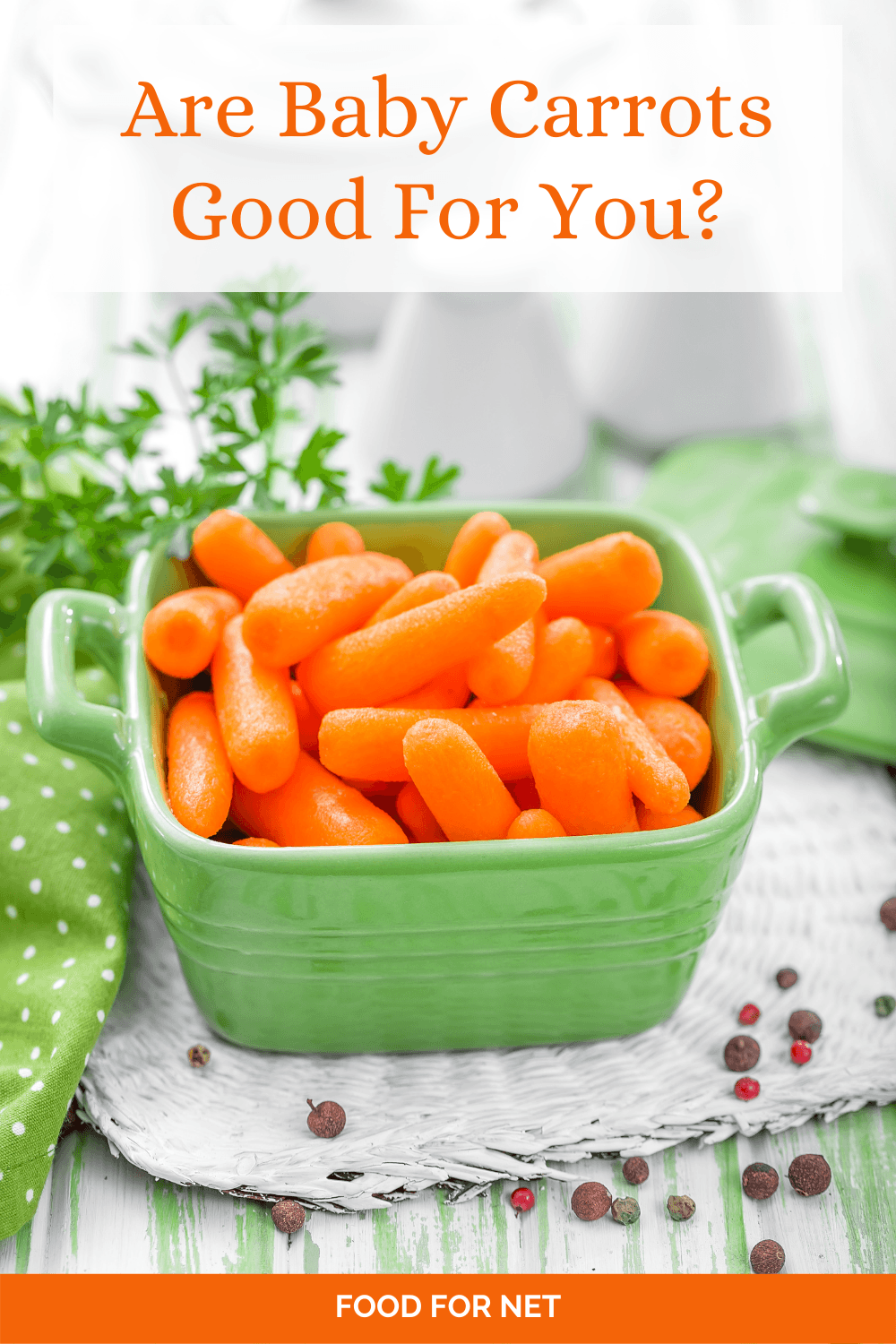
Carrots are fantastic as a low calorie snack that provides plenty of fiber, nutrients, and antioxidants. Baby carrots could be even more powerful, as they’re small and easy to eat. There’s often no prep work either, giving you the chance to eat them immediately. What about the health side of things? Are baby carrots good for you?
Not surprisingly, the simple answer is yes. Just like regular carrots, baby carrots have plenty going for them. Still, it’s important to dig a bit deeper under the surface and think about where they shine and where they’re limited.
Are Baby Carrots Good For You?
- What Are Baby Carrots?
- Benefits Of Baby Carrots
- Problems With Baby Carrots
- Baby Carrots Versus Full Carrots
- Are Baby Carrots Soaked In Chlorine?
- Final Thoughts
What Are Baby Carrots?
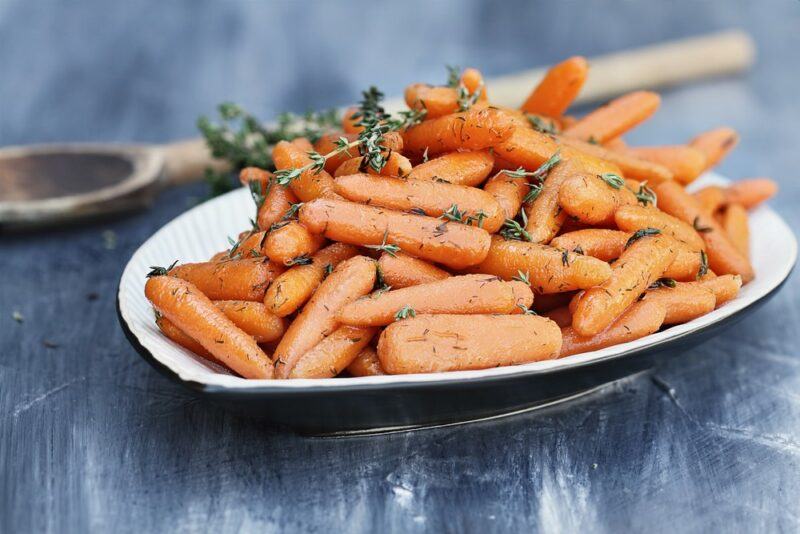
Baby carrots are surprisingly confusing.
The name implies that they’re immature carrots, ones harvested when they’re still young. Such carrots can be more tender than regular carrots and sweeter as well.
Sometimes baby carrots are the result of crop thinning, where they’re harvested to give other carrots more room to grow. Other times, the carrots are specifically grown to be harvested as ‘babies’. Some cultivars are particularly good for producing baby carrots.
True baby carrots aren’t that common. Instead, most of the carrots sold in stores are baby cut carrots instead.
These start off as full sized carrots, which are cut in half and then scraped down until they reach the desired size. This approach is used because baby cut carrots tend to be crunchier and tastier than true baby carrots.
Producing baby cut carrots is surprisingly easy too, as most of the process is automated.
Benefits Of Baby Carrots
They’re A Healthy Snack
Baby carrots are similar to potato chips and pretzels in that they’re a snack that can be easily eaten and has a satisfying crunch. However, baby carrots are less processed than many other snacks and are also much better for you.
In fact, a ¾ cup serving of baby carrots contains just 40 calories. That same serving gives you two grams of fiber, one gram of protein, and less than one gram of fat.
You do get five grams of sugar per serving, but this is natural sugar. None of it has been added in. Besides, five grams of sugar in a nutritious whole food snack isn’t really a big deal at all.
There are plenty of nutrients too, including various B vitamins, vitamin C, vitamin C, calcium, magnesium, and iron.
We can’t forget about the vitamin A either. Carrots are exceptional for vitamin A, giving you far above your daily needs in a single serving.
They Help With Your Eyes
This one shouldn’t be surprising; carrots improve your eye health. They don’t help you to see in the dark though. Instead, they’re relevant for protecting your eyes. This includes reducing the risk of age-related macular degeneration.
If you’re healthy, the compounds in carrots won’t actually improve your eyesight. Still, protecting you against potential eye problems is a highly valuable effect.
They Provide Antioxidants And Plant-Based Compounds
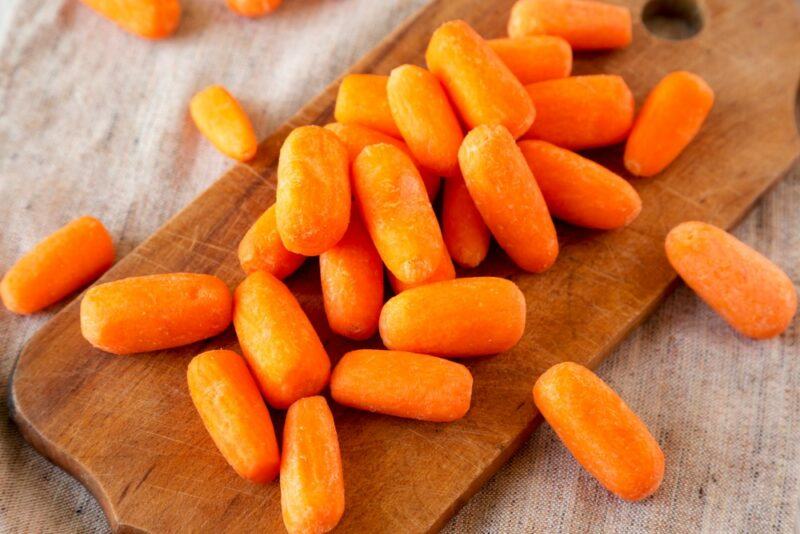
Carrots are most famous for their beta-carotene content. Beta-carotene is a pigment molecule that is responsible for the yellow-orange color of carrots.
Beta-carotene gets converted into vitamin A, but this isn’t all it does. The molecule is also an antioxidant.
As such, beta-carotene helps to decrease the risk of oxidative damage from free radicals. By doing so, antioxidants can even lower your risk of some serious diseases and help to keep you healthy.
Beta-carotene has been linked to a variety of other health benefits as well – and it’s just one of the many plant-based compounds found in carrots.
Seriously, plant-based compounds shouldn’t be underestimated. They’re powerful and may be one reason why people who eat plenty of plants tend to be healthy.
Can Improve Digestion
The fiber in carrots makes them excellent for digestion. In particular, getting enough fiber helps waste travel through your system well, keeping you regular and decreasing the risk of constipation.
Baby carrots are actually exceptional here, as they offer a decent amount of fiber and are also easy to eat. You might even keep some nearby and snack periodically.
There’s also a strange thing with fiber. We all know that it’s essential for digestion and health. Many of us even think we’re getting plenty of fiber. Yet, most Americans fall far below their daily fiber needs.
This pattern makes easy to eat sources of fiber incredibly valuable.
They’re Great For Your Teeth
This effect might be surprising. Baby carrots are actually fantastic for your teeth because of how crunchy they are.
They actually function a little like a toothbrush, helping to reduce plaque buildup. This is exceptional, given that most snacks put your dental health at risk instead.
Good For You Heart
Carrots have some interesting heart health benefits too. For starters, their fiber content helps to balance your cholesterol levels. There’s also potassium present, which is relevant for blood pressure.
High blood pressure and cholesterol are both risk factors for heart disease. Keeping these in check helps to lower your heart disease risk and keep you healthy for longer.
Can Help You Lose Weight
Baby carrots also work well for weight loss. How could they not? They’re a delicious and crisp snack that’s low in calories and is surprisingly satisfying.
Carrots are also much healthier than snacks like potato chips. In fact, simply swapping out your chips for baby carrots would decrease your calorie intake and promote weight loss.
Eating carrots on their own is the simplest approach, but it’s not the only one. Using them with a dip, like hummus, works well too. This gives you some extra nutrients and a fantastic contrast of flavors.
They’re Not Wasteful
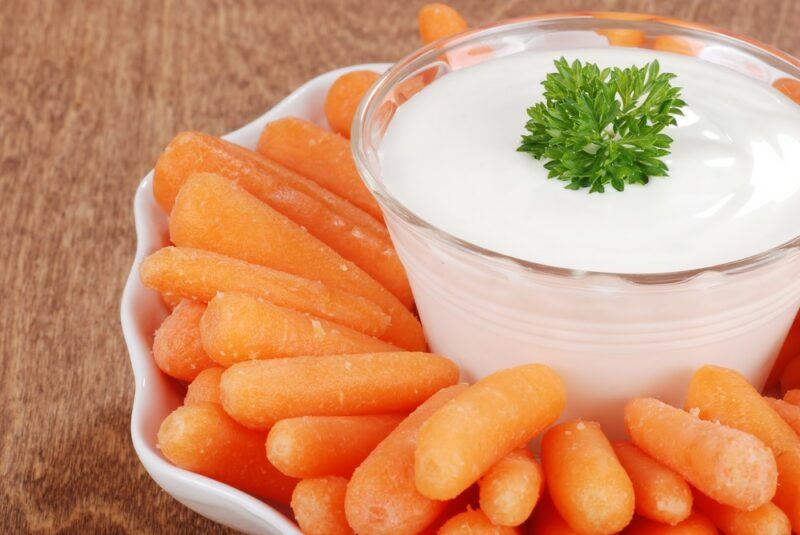
Baby carrots seem like a waste of energy and also of carrots, as turning a single carrot into two baby ones means there’s a lot leftover.
However, the process isn’t actually that bad. For one thing, the leftover carrot isn’t wasted. It’s used as animal feed instead.
Plus, many of the carrots used are ugly. You know, the knobby ones that don’t look too good on the shelves and never sell. Making baby carrots from these means that more carrots get used, leading to less waste.
Problems With Baby Carrots
You Need To Choose Carefully
If you’re buying baby carrots from the store, it’s important to be a little cautious. Some bags end up with a lot of moisture. This can decrease the shelf life of the carrots and even make them rot.
When you open the bag, make sure your carrots aren’t soft or slimy either. You’re looking for crisp carrots instead. This is a sign that they’re at the peak of freshness.
They’re Not Great For Keto
Carrots are relatively high in carbs. For example, that ¾ cup serving that we talked about earlier contains nine grams of carbs, only two of which come from fiber.
The carb content could be a problem for anyone following a keto diet. You might not need to avoid the carrots entirely, but you may need to be cautious with your portion size.
They Can Turn Your Skin Orange
Here’s a slightly strange effect. Overdoing it on orange foods like carrots can actually give your skin an orange tinge.
This happens because of the beta carotene. It’s a pigment molecule, after all, and too much of it in your bloodstream ends up influencing your skin tone.
Thankfully, the orange effect isn’t harmful at all. It’s easily reversed too. You just need to cut down your carrot intake.
That said, turning your skin orange isn’t easy. You’d need to be regularly eating at least three full carrots every day (or possibly more). Most people won’t need to worry about the effect at all.
Raw Carrots Can Be Difficult To Digest
While raw vegetables seem like the ideal for health, they are difficult to digest. This can mean that you don’t absorb all the nutrients they have to offer. Some people also experience side effects, like gas and stomach cramps.
If you have a sensitive digestive system, you might find that you need to cook baby carrots, rather than snacking on them raw. Doing so still gives you all the benefits of baby carrots, while minimizing digestive side effects.
Baby Carrots Versus Full Carrots
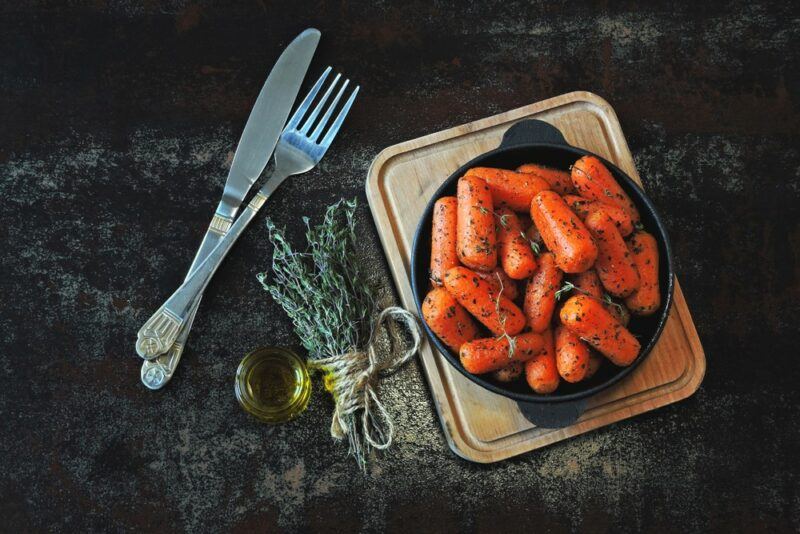
So, which is better? Baby carrots or the real thing?
Well, true baby carrots can be appealing, as they’re tender and surprisingly sweet. They don’t give you the same crunch as a full carrot, but this isn’t always a bad thing.
Full carrots are crunchier. They also make excellent snacks and work well in many recipes. However, you generally need to wash, peel, and cut the carrots before using them.
Baby cut carrots fall somewhere in the middle. They have the same crunch as full carrots, but are much more convenient.
Regardless of the type, carrots can be used in plenty of ways. You can eat them raw, juice them, or cook them. Boiling baby carrots and then serving them with a little butter is a simple yet delicious approach. You can roast baby carrots too, just like you can with full sized ones.
Are Baby Carrots Soaked In Chlorine?
There’s a persistent rumor that baby carrots are doused in chlorine. Some people even say that their white film is this chlorine making its way to the surface.
Chlorine is used. That much is true. A very dilute solution of chlorine is applied to the carrots to rinse any bacteria. Then the carrots are rinsed with water to get rid of the chlorine.
This practice isn’t as bad as it sounds, as the chlorine levels are exceptionally low (similar to the amount found in drinking water). A similar approach is also used for most other cut fruits and vegetables. There’s nothing unusual about it at all.
As for the white film, that’s simply dehydration. Cut sections of fruits or vegetables often dehydrate somewhat. The effect is particularly noticeable with baby carrots, as their entire surface is a cut area.
Final Thoughts
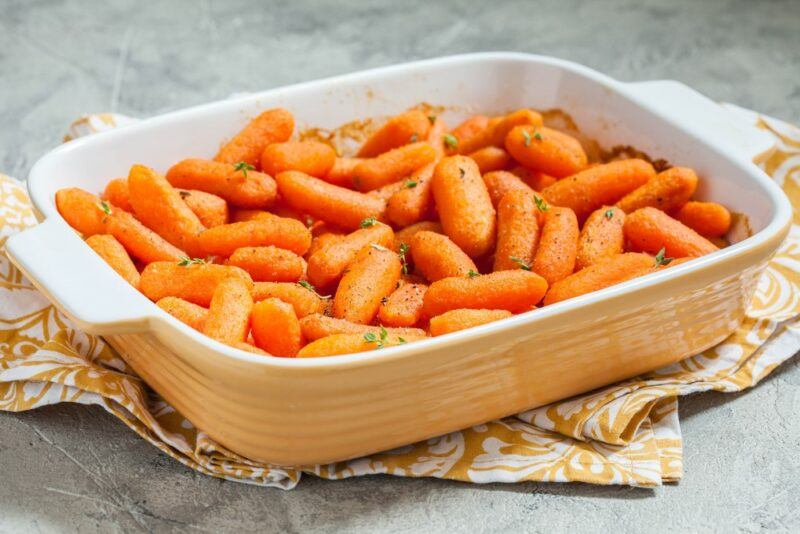
Baby carrots aren’t nutritionally better or worse than regular carrots. They’re simply a smaller prepared version of the same thing.
Some people love the carrots, partly because they’re so easy to use. They’re also much healthier than snacks like potato chips, pretzels, or chocolate. Other people turn to full carrots instead, preferring their flavor or lack of processing.
There’s no right or wrong answer here. Either type of carrot will give you plenty of health benefits. And, if baby carrots help you eat more vegetables, then that’s an excellent reason to eat them regularly.
Frequently Asked Questions
Can You Freeze Baby Carrots?
Yes, baby carrots can be frozen and doing so is an excellent way to make them last longer.
The best approach is to blanch them first. This involves plunging them into boiling water and then chilling them in ice water. Once you’ve drained the carrots, you can freeze them in an airtight container.
You can skip the blanching step if you’re in a hurry. The baby carrots will still freeze well, but their texture after thawing won’t be as good.
Like all frozen fruits and vegetables, thawed carrots will never have the same texture as they did before freezing (even if you blanch them first). This is because when water freezes it bursts some of the cell walls. These cell walls remain broken once the carrots have thawed, resulting in a less firm structure.
How Many Baby Carrots In A Serving?
Twelve baby carrots is one of the most common serving sizes. This is roughly the same as two decent handfuls of chopped carrots or two medium carrots.
This serving contains roughly 50 calories and matches the criteria for a single serving of vegetables (for your daily count). Of course, you might actually eat more or less carrots than this, depending on your needs and the rest of your diet.
What’s The Best Way To Store Baby Carrots?
One of the best ways to store your carrots is also the easiest – simply keep them in your fridge’s crisper drawer.
They’ll keep the longest when stored in some type of resealable container. A freezer bag or a plastic bag will work well. So too will the bag the carrots came in (if it is resealable).
You can extend the shelf life of baby carrots a little by keeping them in a dish of water or wrapping them in a moist paper towel. Doing so keeps them moist and crunchy for longer.
How Long Do Baby Carrots Last In The Fridge?
If you store baby carrots in the crisper drawer, they should last between a week and two weeks. Keeping them in water or a moist paper towel instead will normally give you an extra couple of days.
Are Baby Carrots Processed?
Baby cut carrots, the ones made from larger carrots, are somewhat processed. Most of this processing is mechanical, where the carrots a trimmed down to size.
There is also a dilute chlorine rinse that helps to remove any harmful bacteria from the carrots. This could be counted as processing too. However, the processing isn’t in the same league as products like bread, pasta, and Twinkies.

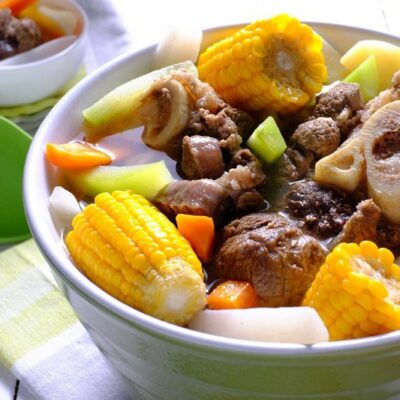
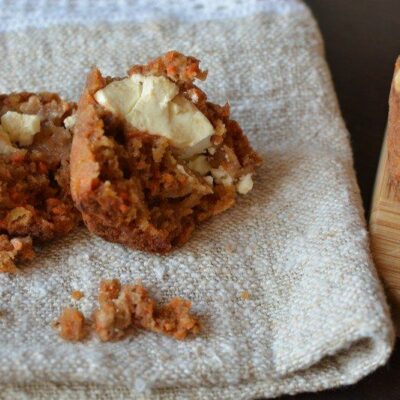
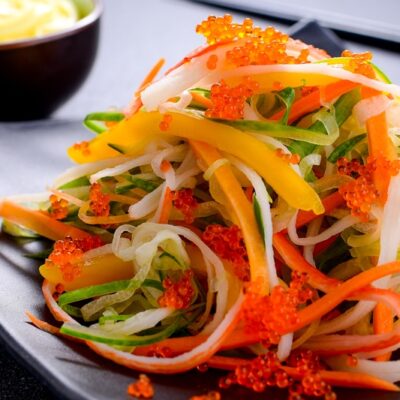

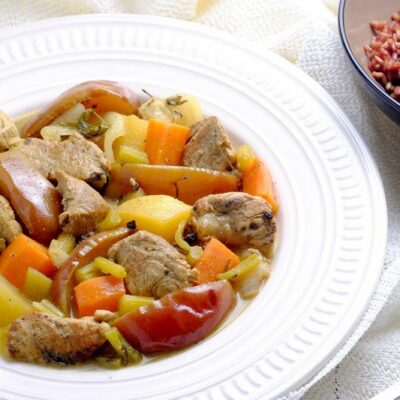
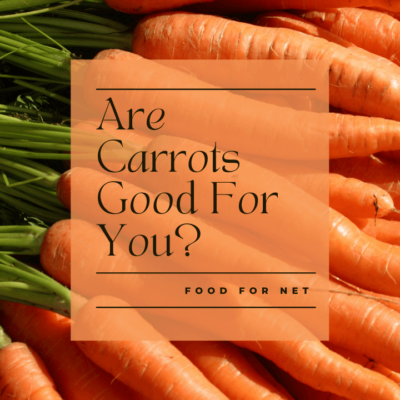
 Are Bagels Good For You?
Are Bagels Good For You?
Leave a Reply